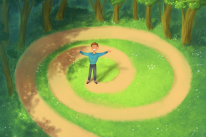
“If you correct your mind, the rest of your life will fall into place.” ~Lao Tzu
Two years ago my life as I knew it changed forever. No, I was not diagnosed with a disease, nor did I lose someone special or have a near-death experience. I actually gained some pretty amazing things: a new house, two dogs, living with my partner, and the chance to be a full-time stepmom to his two children.
But I did not initially view this change in a truly positive light.
After the dissolution of a long-term relationship, I had spent several years living alone in my cozy apartment.
I cherished my independence and, for a time, the solitude.
I came and went as I pleased. If I was seized with musical inspiration, no matter what the hour, I played and sang. I had quiet time to read and write.
My friends dropped by to hang out, I played shows with my band, and I regularly went out for meals and concerts.
Yes, life was pretty darned good—except for the fact that I was alone.
After interesting, humorous, and some downright sad attempts at dating, I met my partner, a wonderful man. He lived an hour and a half away, but we made it work, seeing each other on the weekends. His two children were then living with their mom in Quebec.
My weekends with my partner were like mini-vacations. We kayaked, went out for meals, and laughed with abandon. Relaxation was our default setting.
Fast forward two years, and traveling was beginning to lose its novelty, especially when poor weather made the roads dicey. Around this time, the kids asked to come and live with their dad. We knew the back and forth wasn’t going to cut it any more; the kids needed stability, so we buckled down and bought a house together.
This was a lot to take on all at once, and I knew it. I could see it written on the faces of my friends, colleagues, and family when I described our plans. But we loved each other, we were committed to each other, and it seemed like the most practical solution at the time.
I left my apartment, my partner left his house, and we merged our lives.
I soon found I was walking on air, but not in the elated type of way—more so that the familiar ground was disintegrating from beneath my feet piece by piece.
Even before the kids arrived, I started to feel overwhelmed with this new commitment, this new negotiation of space.
I was used to putting things where I wanted them, eating when I felt like it, and functioning according to my personal schedule, but suddenly I was accountable to someone else—and he had equal right to give input on everything from where the pots should go to whose sheets should go on the bed.
My relaxed state was replaced with the tension of constant compromise.
Doubt began to snake its tendrils into my mind—had I made the right choice?
The kids’ grandparents drove them cross-country at the beginning of that summer. The day, the week, they arrived is something of a blur, and all I really remember is the French (they are all francophone).
My partner, understandably, was so excited to see his family that sometimes he forgot to translate and I started to feel shut out, not only from the conversation, but from my life as I knew it.
Becoming a stepparent is not a job for the faint of heart, especially if you have no children of your own. Being a teacher, I know how to relate well with kids—in the classroom. The natural bond between a parent and child is one that builds from birth, and I was nine and ten years behind.
Also, the initial boundaries my partner set for the kids did not match up to those I would have set, had they been my children. Jumping on beds, screaming in the house, and crashing around upstairs, for example, were not activities I could live with. Quiet time for contemplation had virtually disappeared.
I sorely missed my musical outlet. Our basement was unfinished, and so the only place for the piano and my other instruments was in a little parlor room off the front hallway—a room without a door. My days of unfettered musical expression seemed over.
Important parts of my old life seemed to be moving out of reach, and I began to feel the bitter seed of resentment growing, growing, growing.
I felt like a stranger on the periphery of my own life and started to build up walls to protect the core of my essence, which I was terrified was the next thing to be taken away—“I” would disappear in this new role and new life.
Not wanting to upset the kids or my partner, or admit to others that I was struggling, I kept my turmoil private and tried to go through the motions of my new role.
My mindset did, of course, affect those I was living with, because I had become depressed and detached.
My withdrawal compounded my problem of connecting and made me feel more isolated and resentful and it became a vicious cycle.
I was miserable.
Somehow, gradually, through reading and much introspection, I came to realize that it was my attitude that was making things this unbearable. Yes, it was a totally different situation than I had bargained for, and yes, parts were challenging, and yes, some of the freedoms I enjoyed from my “old life” were constrained by the situation.
But, instead of dwelling on these things, I started to look at it from a different perspective: What had I gained?
In what ways had my life been enriched (or had the potential to be enriched) by my new circumstances? I started to make myself notice positive things each day and I wrote them in a gratitude journal.
Instead of painting myself as a victim on whom changes had been imposed, I became more proactive and vocal; I started to communicate my own boundaries and needs. There was some conflict at first, but we were able to find workable compromises.
Suddenly, my situation seemed a lot more livable, even enjoyable.
Last summer, my partner and I finished a room in the basement that is my music studio. Having a space of my own has helped me a lot, but the most powerful difference came from my mind shift.
Today I am fully grateful for the amazing life I am blessed with. It is different than it used to be, but I am so much richer for it. I have a loving partner, two wonderful kids, two dogs, and two cats that provide us with endless entertainment, and a beautiful home that now meets all of our needs.
Life in a family is never dull. There are still challenges (both expected and surprise), but I no longer let them overwhelm me. I now know that I have the power to choose my attitude toward my circumstances.
Change is inevitable. Change challenges us and pushes us beyond the edge of where we are comfortable.
How we respond to change is entirely up to us.
Instead of dwelling on what is different, or what is hard, we can choose to foster an attitude of openness and gratitude. With this change in mindset, we are able to see opportunities for enrichment and growth that present themselves and we can embrace them as the gifts they are.
Photo by kevinmarsh
About Kelly McQuillan
Kelly McQuillan is a musician, teacher, and writer from Surrey, British Columbia. She is a member of The Little Brother Band and is also working at establishing herself as a singer-songwriter. You can visit Kelly at her website or myspace.













 Though I run this site, it is not mine. It's ours. It's not about me. It's about us. Your stories and your wisdom are just as meaningful as mine.
Though I run this site, it is not mine. It's ours. It's not about me. It's about us. Your stories and your wisdom are just as meaningful as mine.
Beautiful writing – thank you Kelly. I guess we all experience those moments when our own life feels suddenly foreign to us. It’s a good advise to then start changing our mindset, so that happiness will follow. Thanks again and enjoy your new exciting life 🙂
Thank you : )
Great article. Your experience is somewhat parallel to mine. A long-term relationship ended about 5 years ago in which I took very seriously. After moving out and finding an amazing place that I could call my own I found myself loving the freedom – almost too much. Fast forward 3 years later with several unsuccessful dates I met an amazing guy. We live in different towns, less than an hour away but my life went from “not doing anything tonite” to “always being on the go”. At the time, he was going through a very bad custody battle for his 3 year old son. Life was very different and I definitely resisted change to a point of developing pretty bad anxiety and panic. Reading this website and seeking help through a therapist has helped tremendously. I was living in a comfortable bubble before and not wanting anything to disturb that I kept change at a very far distance. I am so glad that I stuck through it and never gave up. My life is much more richer now. I have an amazing boyfriend who is an amazing dad to the best little boy ever and soon we’ll be moving in together. I couldn’t imagine my life without them right now. They helped me grow in ways I never thought possible. Pushing the boundaries and living outside my comfort zone was scary but it was what I needed to be able to grow and I am able to proudly look forward to the future. Thank you for this article…always reinforces that you’re not the only one going through change.
Happy to offer reinforcement : ) One of my favourite quotations (and one that has kept me open to new opportunities over the past several years) is: “Life begins at the end of your comfort zone” ~ Walsch
Best wishes to you!
That’s beautiful. Thank you for that.
Thank you for sharing your experience, Kelly. In reading this I realized what is making my current situation so difficult for me. I have been in the process of changing my life circumstance and it has taken a long time, very long. I have always enjoyed change for the very reason you talked about. It provides exciting new opportunities. I was so focused on those and looking forward to it. Because it has taken so long to take all the steps necessary to build this new life I want, I have grown very discouraged. I naturally bring a good attitude toward new adventures, but this time I lost it and didn’t even realize it. Loved the article.
Erin, I’m sorry that you’re feeling discouraged. Once in a while, I still feel discouraged, too, even though my outlook has changed radically toward the positive. I think it’s natural, the ebb and flow of emotion — especially amidst change. When I occasionally feel down or discouraged, I pull out the gratitude journal again. Writing in it forces me to pay attention to what is good in the moment, and to celebrate how far I have come with changes and goals. It helps me see the opportunities that are presenting themselves every day, even if they aren’t what I was expecting : )
Best of luck to you in your journey!
Currently in the “interesting and often sad” experiences of dating phase of my life, I was encouraged by your story. I’ve also found a tremendous benefit in a gratitude journal. Thanks for sharing.
Hi Danette,
I’m so happy to have been able to offer encouragement. Dating can be a challenging experience. It can also be an amazing opportunity to meet people you might never have crossed paths with and to hear their stories. Looking back on that time in my life, I wish I’d been more open to that part of it, instead of just focusing on finding ‘the One.” The perspective of hindsight – lol. Stay true to yourself and what you really want, and the right person will come along..probably when you least expect it : )
You have no idea how wonderful and apropos it was to read this! Thank you so much!
So happy to hear that! You’re welcome : )
This is a beautiful reminder for me today! Thank you SO much for this post…I am so grateful for Tiny Buddha. With love, Whitney
That’s why I love reading the articles on Tiny Buddha too, Whitney — lots of great reminders and perspective : )
Thank you Kelly. This is almost precisely my experience…except I have not mastered the gratitude part yet. Working on it though. It’s comforting to hear your story.
Hi Jonathan,
The gratitude part was hard for me at first, too. Really hard. I read somewhere, (it might have been an article on tinybuddha) to just start with really basic things, like “I’m grateful for my breath” or “I’m grateful for my body, my hands, my feet, etc…” It all started to flow out from there. Right now I’m grateful that, by sharing my story, I was able to offer you some comfort in your experience. I wish you all the best : )
Great article overall except for this statement:
“Yes, life was pretty darned good—except for the fact that I was alone.”
What is wrong with being alone? Why do so many women who have so much going for them think that they’re “incomplete” or life is not that great unless they have a man?
I agree. I know a woman in her 50s who is divorced and lives alone by choice. She has no desire to live with anyone because she’s a better person for others by having her own space. This lady is the most positive and happiest woman I know. She is literally a walking “light” with a big heart. I don’t think living alone is wrong. It’s a choice
Absolutely, it is a choice. I also know someone who has made this choice and, like your friend, is thoroughly happy with her situation. I did not mean to imply that living alone was wrong. I love how you describe your friend as a “walking light” – that’s a beautiful image : )
You’re right, there is absolutely nothing wrong with being alone, if that is what someone wants. I thought it was what I wanted for several years after the breakup of my second long-term relationship (I was engaged). But lots of introspection led me to know that, personally, I wanted to share my life with someone. I’m sorry if the statement read like a generalization. Cheers ~ K
Kelly,
Thank you for your article. I really enjoyed it.
I can relate to your experience. I moved in with my girlfriend a couple of years ago. I think it went quite well considering, we’re both beyond middle age, I’ve never been married, nor have I ever lived with a partner.
We both get along extremely well. She likes my family, and I like hers. We rarely get into any significant arguments, and we’re both respectful of each other’s space and privacy. But most importantly, we are truly in love with each other.
We owe most of our success to our spiritual practice. We both practice meditation on a daily basis—in particular, loving-kindness writing meditation. This has truly transformed the way we relate to each other. We grow more in love with each other every day.
Thanks again!
Charles A. Francis
Hi Charles,
Wow! Your relationship sounds truly inspiring. I’m curious about the ‘loving-kindness writing meditation” ~ can you tell me more about this? Thanks : ) Kelly
Dear Kelly,
What the writing meditation does is reprogram our subconscious in a way that seems to be much more effective than simply reading, hearing, or reciting the words.
The loving-kindness writing meditation works really well for improving our relationships and healing the wounds from the past, as well as overall
spiritual development.
If you want a copy, send me your request at: charles@mindfulnessmeditationinstitute.org
Warm regards,
Charles
This is a great reminder for me to think of all the things in my life that I am so thankful for. Nice article, uplifting! Thank you.
I’m happy to hear that, Danielle! All the best to you : )
I just wanted to say your blog really resonates with me~ Two years ago I met a amazing man and started my life with him and his two sons. Had I known all the changes I would go through….I had no idea 🙂 I like the quote by John Lennon ” Life is what happens when you busy making other plans” ..Life is all about change..learning to adapt to change and enjoying life 🙂
I LOVE that quote! Best wishes to you in your never-a-dull-moment new role as step-mom 🙂 Kelly
Love it!
Thank you : )
Thank you for the article. Oh, i must say that i feel so bad for you losing your private sanctuary of creative bliss! You must love that man so much to take on his children. I am currently living with my partner who has a four year old son and i really struggle with it! It has become a lot better recently; also with the conscious mental shift, but i still question if i am truly ready to commit to another womans’ child! Luckily we only have him one week out of 4 but it’s still really full on. I Am a painter and writer and defiantly need my quiet time. I find it really stressful. Good luck with your new challenges, blessings xx
Kelly, thank you so much for sharing your experience. I feel less alone after reading your post. I, too, am a childless stepparent. I, too, have struggled to make sense of my new life in a way that’s mindful and honest. Meditation and yoga help. I find that the more I step back, breathe, and let go, the more peace I find. I spent the first two years of my marriage trying so hard to be Super Stepmom and now I see that I’m not a mom, I’m not a parent. I’m something else. I’m figuring out what that is. I hope it’s okay to share my blog here – may it be of benefit to those in a similar situation: http://www.childlessstepparent.com
I love the sentence: “Change is inevitable. Change challenges us and pushes us beyond the edge of where we are comfortable.